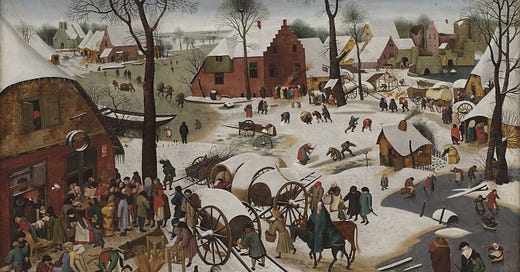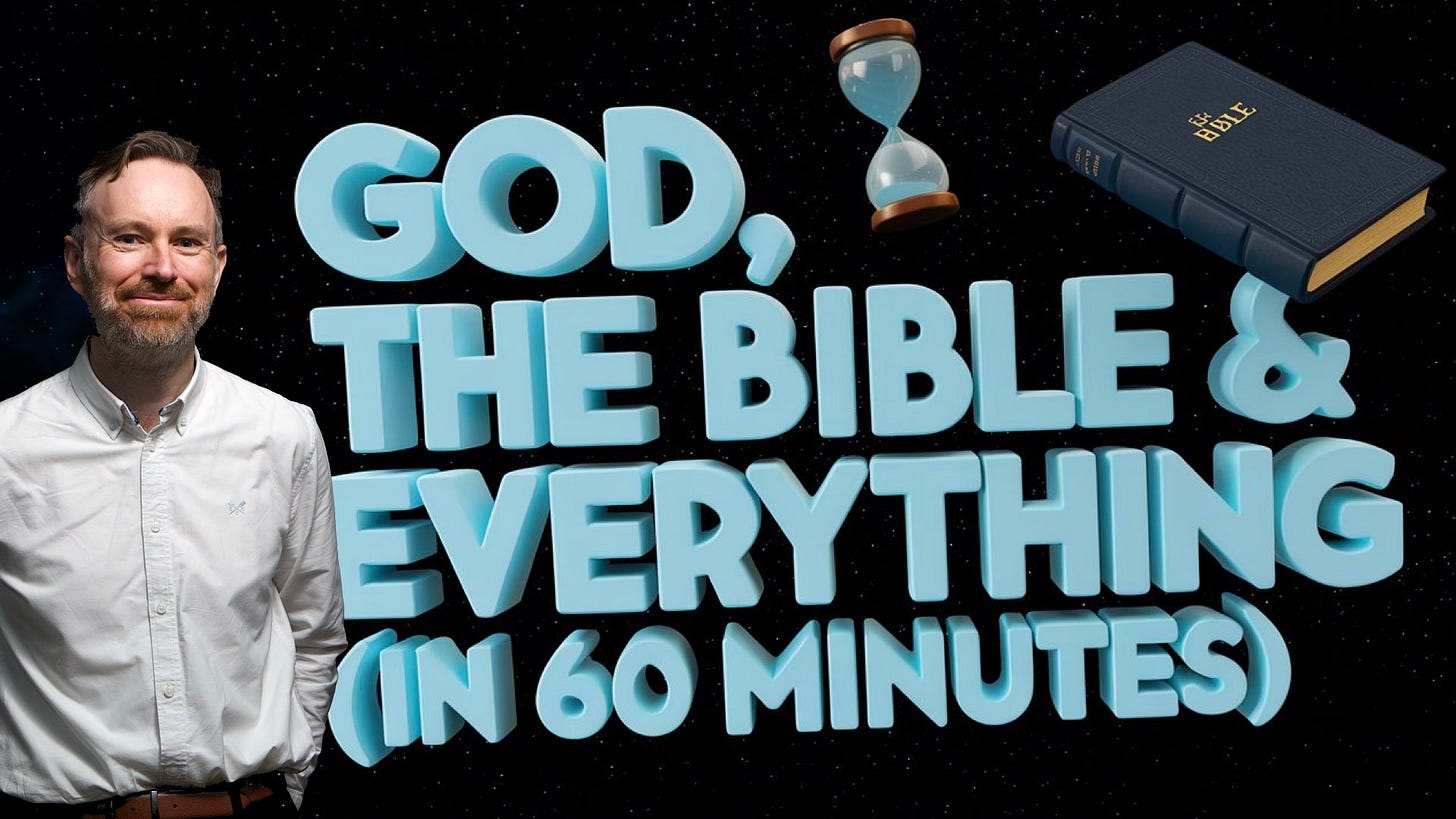It isn’t Christmas yet. We’re still in Advent. I know. I went on about Advent in late November, arguing that we should push Christmas back to Christmas Day, which is the glorious start of Christmas, not the gluttonous climax.
Today, I’d like to write about Christmas Day as it is the beginning of a run of feast days and festivals, some of which are not related to Christmas at all. 26th December, what we call ‘Boxing Day’ in England, is the Feast of St Stephen, the very first Christian Martyr. The next day, we remember John, the Apostle and Evangelist. On 28th December, we’re back to the Christmas story, commemorating the Holy Innocents massacred by King Herod. More violence is remembered the next day on the wildly popular St Thomas A Becket. The Church of England remembers John Wycliffe on New Years’ Eve, as it should. And then on New Years’ Day, we’re back to the Christmas story with the Naming and Circumcision of Jesus, eight days after his birth. Finally, we celebrate Epiphany on 6th January.
And… relax. Wait. Wasn’t this meant to be holiday?
I’m committed to producing only one of these instalments of Cary’s Almanac per week. I don’t want to be Japanese Knotweed in your inbox. So today, we’ll look at Christmas, St Stephen’s Day next Friday, and the Holy Innocents the Friday after that.
Those other days will have to wait until next Christmas, or the one after. There is plenty in the Church of England’s calendar to keep us going to 2027, at which point we could start all over again. Plus, at some point, there’ll be a delightful, beautiful hardbacked version of Cary’s Almanac to enjoy, refer to and give away.
And so to Christmas.
The True Meaning of Christmas
It’s easy to be grumpy about Christmas, complaining about the traditions, vile jumpers, oddly coloured tinsel, dated decorations and enforced jollity whilst eating food we don’t eat at other times of the year. For a reason.
We can spiritualise this grumpiness by insisting we’ve forgotten the ‘true meaning of Christmas’. This is the theme of many TV sitcom Christmas specials, which often contains an overnight supernatural event. Our favourite characters go to humiliatingly comic lengths to create the perfect celebration or get the perfect present, only to learn that Christmas is not about gifts, but the people around you. Or forgiveness. Or something. It doesn’t much matter. I’ve even co-written episodes like that. I think that was the moral of the story on the Christmas episode of Miranda from Series 2 which was just repeated on BBC1.
Holy, Grumpy and Prickly
There’s a specifically Christian version of this grumpiness, particularly popular within my own tribe of Evangelical Anglicans. We desperately worry that no-one is paying any attention to the baby in the manger and, more importantly, the doctrine of the Incarnation. We’ve all heard those sermons about how the tree and the wrapping paper are all very well, but let’s not forget Jesus, God’s incarnate Son who has come to live among us and die for us. Some of us have given those sermons. I probably have. A few readers have one such sermon ready to go.
So here’s my request: don’t preach that sermon about ‘the true meaning of Christmas’. Don’t tell off the congregation for having a nice time and forgetting theology. Why not? I have two reasons.
The first is this: the finger-wagging implies that joy and theological reflection are opposites. You’re either having a nice time opening presents or sitting alone with an open Bible reflecting on the majesty of the Incarnation. Theology is medicine that must be consumed neat. And without sugar.
No. This is dead wrong. God’s word is sweeter than honey. This the subject of the longest chapter in the Bible: Psalm 119, literally an A-Z of why the Bible is life-giving, liberating and wonderful.
My second reason is that your congregations will contain people who only come to church once a year, at Christmas. Are you going to welcome them with tutting disapproval that they’re going to enjoy themselves on Christmas Day, but probably shouldn’t?
Consider why these people have come to Church: because Christmas is the only Christian festival left. It’s the last one standing. For one day, the entire nation stops. A lot of people go to Church. It is the only time when people act out plays, often a nativity play.
This is an old tradition. Our pre-Reformation ancestors acted out all kinds of Christian stories at various times of the year. The Feast of Corpus Christi, the Thursday after Trinity Sunday in May/June was a popular day for that. Dozens of Bible stories were presented by various guilds on stages across towns and cities.
We’re now down to one story. The Christmas story. It’s a really good, rich, complex and far-reaching story. Can we not celebrate that? Rather than tell people off for forgetting the true meaning of Christmas?
Christmas, Actually
Many seem to delight in berating people for not knowing that the world ‘stable’ doesn’t actually appear in the Christmas story. It is true the baby was placed in a manger. And there was no room at the inn. And perhaps the Magi arrived later, and yes, the word ‘house’ is used, and perhaps Jesus was a small child by that point. Why are we trying to deconstruct this story that is the last remaining Christian story in our nation’s shared and collective imaginations? Can I request that we don’t do that?
There are many traditions based around the nativity story itself. Churches have developed their own traditions over the centuries. Again, people like to point out that a lot of traditions are merely Victorian. What’s wrong with that? Moreover, many of these traditions were reinterpretations of older traditions. The Christmas Tree may been imported by Prince Albert from Germany in 1840. But English households had been bringing holly and ivy into the home for Christmas for a thousand years. The sharp holly refers forward to a crown of thorns the Christ Child will wear. And nothing could be more traditional than a candle. Churches used to be full of them on Christmas Day, to celebrate that light that was coming into the world.
These customs have been observed by our parents, grandparents and great-parents. Christmas is a rare time of inter-generational celebration. Again, this is something to cherish.
I’m talking to my former self here. I’m still not very Christmassy. I have become much more so since having children, but also by becoming more and more Anglican. If you’d asked me fifteen years ago about the true meaning of Christmas, I would have said it’s about the incarnation. Ask me now and I’d say Christmas is about, well, Christmas.
Clearly this is an odd, click-baity thing to say. But one of the things that we remember at Christmas is former Christmasses. When we were kids. When we were together as a family. When certain relatives were still alive. When we had less stuff but were happy. When our houses weren’t as nice and it didn’t matter. When we had to eat in the middle of the night because the turkey was just so enormous and took eons to cook. And we were together.
One of the reasons English people love to watch the Morecambe and Wise Christmas Special from 1971 with Andrew Preview (sic) is not just because the sketch is funny, because 28 million people watched. That was nearly half of the country at the time.
Cancel Christmas
My spiritual forebears, the puritans, cancelled Christmas altogether. I understand why. I hold the puritans in high regard. Their popular killjoy reputation suggests they were concerned that everyone was enjoying themselves at Christmas, so they were probably doing something wrong. Okay, there may have been a bit of that. And some were drinking heavily, gambling and subjecting animals to cruelty. But their main beef was theological. There’s something called The Regulative Principle. Essentially, it is this: you can’t do anything unless the New Testament says you can. Even if it sounds like it should be okay. Or even a good idea – like celebrating the Birth of Christ.
This is why some congregations – especially in Scotland – sing Psalms without instruments: because the New Testament doesn’t specify that you should use instruments. So you don’t. Ironically, the Psalms themselves tell us to praise God on the harp and the zither. But they are in the Old Testament. We live in the time of the New Covenant, no longer bound by the old. So you no longer celebrate feast days and festivals – because they are not commanded in the New Testament. That includes Christmas. There is no mandate for doing so. So you don’t. Instead, you feast every Sunday on the Lord’s Day, as commanded by Christ himself. They would argue they feast more than anyone.
This is what happened in Scotland. There, the Reformation was heavily influenced by a version of Calvinism that held to the Regulative Principle. So Christmas was cancelled. And remained cancelled. Christmas Day was not even a public holiday until 1958. Can you believe that?
That is why Hogmanay become the great midwinter festival in Scotland. It celebrates a new calendar year, so not religious at all. That makes if fine, apparently.
It doesn’t sound right, does it? But that’s where spiritual purity takes you: to the cancellation of Christmas. Because it lacked spiritual purity.
You know what else lacks spiritual purity? Me! And you.
Yes, Christmas is all about Christ. The clue is in the title. But it’s also about everything else. Family. Peace. Togetherness. Feasting. Presents. Log fires. Grandparents. Kids. Reruns of Christmas specials. And the true angel of Christmas: St Michael: Michael Buble.
It's still Advent. I’m sticking to that. But when it comes, Merry Christmas. May all your bizarre family Christmas traditions warm the cockles of your heart.
If you found that interesting, or enjoyed that mild rebuke, then why not share it?
Cooper and Cary’s Last Words
As you’ve already read, I’ve changed. Only a bit, but it’s fairly profound. Certain Christians are reluctant to talk about change, concerned it might look like they’ve ‘gone liberal’, which is the unforgiveable sin in that world. I reflect on this with my good friend Barry Cooper in the last ever episode of Cooper and Cary Have Words. We started back in 2016. Things, including our own lives and perspectives, look rather different now. If you like the blog, you’ll probably enjoy this final episode - #180 – of the podcast. Don’t worry. You’ll catch up…
If you want me to come to your church in 2025 to be funny for an hour, please get in touch. March has booked up fairly quickly, and Saturdays in April, May and June are also getting busy, so speak now – or soon – if you want a date before the summer holidays.
A few more links:
I wrote about Sitcom Christmas specials about this time last here over Seen and Unseen.
And what is a Christmas movie? I asked a Reformed Mythologist:
And isn’t Christmas thrillibots?







“Theology is medicine that must be consumed neat. And without sugar.” Great line.
I have long contended that one reason few evangelicals excel in debates with Muslims is that the only time they hear the incarnation taught is in a lame lightweight evangelistic talk about the true meanings of christmas.